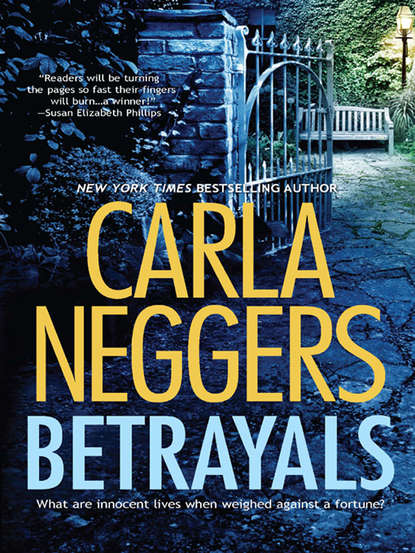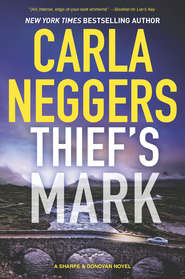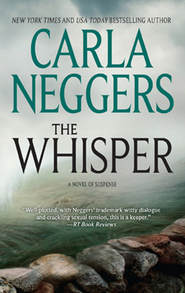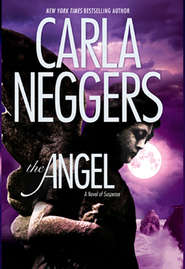По всем вопросам обращайтесь на: info@litportal.ru
(©) 2003-2024.
✖
Betrayals
Автор
Год написания книги
2018
Настройки чтения
Размер шрифта
Высота строк
Поля
Jean-Paul heard a sound from the door to the house behind him and turned, spotting the U.S. Army issue Colt .45 Jared Sloan held in his right hand.
When Mai whipped around, she paled and staggered back a step. “Daddy…”
“In the house,” Jared said. He stepped out onto the deck. “Now.”
Mai didn’t need to be told twice.
“It’s been a long time,” Jean-Paul said mildly.
“Get out.”
“I have no desire to hurt you or your daughter.”
“Crawl back into whatever hole you crawled out of and don’t come near my daughter again. Understood?”
Jean-Paul nodded. “As you wish.”
He backed off the deck, went slowly down the walk and through the gate, hoping he was concealing his jubilance. Jared Sloan continued to hate and fear him. Yes! That meant that he, Jean-Paul, had secrets yet to tell.
He had leverage.
You’re crazy to go up against these people again. But what did he have to lose? His life had been shattered a long, long time ago.
He could get the Jupiter Stones. There was still a chance.
For you, Maman…
And he could have his revenge. For his mother, for himself. Maybe, at last, there could be peace in his soul. For so many years, it had been too much to hope. Now…he had to try.
Shutting the gate behind him, he found that he was crying. He couldn’t stop himself. Tears streamed down his scarred face, blinding him, and the more he brushed them away, the more they came, until finally he stumbled down the street, letting them come.
There could yet be peace. And justice. Yes, he had to try.
Six
Thomas Blackburn emphatically did not read supermarket tabloids, but anticipating her grandfather’s attitude, Rebecca purchased two copies of The Score at a Fanueil Hall Marketplace newsstand before heading up to Beacon Hill. As was her custom, she avoided the subway and cabs and instead walked from her studio, going as much as possible by way of the renovated waterfront. She loved to stop and watch the seals outside the aquarium, or just take in the changes in the Boston skyline since she’d last lived there.
She resisted taking a good, long look at the tabloid’s front page as she came to the quiet, black-lanterned streets of Beacon Hill. The famous photograph of her, Jared and Mai in Saigon was one Rebecca would never forget. She didn’t own a copy. She didn’t need one. Even after fourteen years, without stimulus and often without warning, she could hear the wailing of newborn Mai Sloan and feel the infant wriggling in her arms, twisting for the milk-filled breast Rebecca couldn’t offer. She could feel Jared’s weight against her, could see him, pale with shock and the loss of blood, his face set hard against his pain. And she could feel her own horror and disbelief, could recall every moment of their agonizing trip home.
Their Chinook helicopter had flown them to a U.S. Navy ship waiting in the South China Sea. Unwittingly, they had become a part of Option IV, the largest helicopter evacuation in history, and among the last Americans to leave Saigon. They were taken to Manila, where surgeons removed two bullets from Jared Sloan’s shoulder. Rebecca had waited until his parents met him there. Then she’d boarded a plane alone to Hawaii, then on to Boston to pick up her stuff, and, finally, back home to Florida. She hadn’t seen Jared or Mai Sloan since.
She had to look at the tabloid picture of a week ago, of the two people she’d gotten out of Saigon in its last tortured hours.
She stared at Jared’s hard-set face. He hadn’t changed. She wished he had. She wished looking at him now she saw a man she didn’t remember so well, hadn’t loved so much so long ago…hadn’t betrayed her.
Mai, in the background, was everything Rebecca would have hoped and expected for Jared Sloan’s daughter. He’d never thanked her for risking her life to get him and Mai out of Saigon, but looking at them now, suddenly Rebecca was glad they hadn’t. Gratitude would only have connected them. It was better for her, and for Jared and Mai, that the cut between them—the separation—had been clean, if hardly without pain.
Rebecca cut down Pinckney Street, walking past a house where Louisa May Alcott had lived, past prestigious Louisburg Square, down to the intersection of West Cedar. It would have been shorter to have gone straight down Mt. Vernon to West Cedar, but that would have entailed walking past the Winston house, which Rebecca preferred to avoid. She had yet to bump into Annette Winston Reed. It was just as well. Rebecca was convinced that Annette had been the chief instigator behind the removal of the historic Eliza Blackburn house from the walking tour of Beacon Hill earlier that spring, something Annette couldn’t have known its current owner had been trying to accomplish for years. Thomas Blackburn made no secret of his distaste at having a guide gather a group of tourists in front of his home, then relate its history and architecture, tell anecdotes about his family and, invariably, close with a sorrowful comment on the “reduced circumstances of Mr. Thomas Blackburn” that had led to the peeling paint on the shutters and trim, the scuffed door, the unpolished brass fittings, the small crack in the lavender glass in the side panel.
Over the years assorted neighbors and historical commissions and even a few politicians had written him letters or told him outright to fix up the place. He’d silenced them by threatening to paint his door vermilion. If a tour guide were particularly courageous—and there were those few—she would tell her group the gory details of the scandal that had led to Thomas Blackburn’s public downfall. In his enthusiasm for “getting the facts,” he had recklessly sent his son Stephen and fellow Beacon Hill resident and friend Benjamin Reed into a fatal Vietcong ambush in the Mekong Delta. Thomas had accepted full responsibility for the incident, but that didn’t halt the failure of his fledgling company or keep President John F. Kennedy from passing him over as his next ambassador to Saigon. Instead the president sent another Boston Brahmin, Henry Cabot Lodge, and Thomas Blackburn had retreated from public life in ignominy.
It all made for juicy walking-tour talk. Thomas had caught one guide at it and ran out of the house, furious not that she’d brought up the touchy subject, but that she’d gotten several of her facts wrong. “People must distinguish,” he’d told Rebecca, “between historical fact and one’s own analysis.”
Nothing annoyed Thomas Blackburn more than sloppy thinking.
Using the key he’d grudgingly given her, Rebecca entered the house through the front door. If shabby on the outside, the place was in reasonable condition on the inside, but certainly no showpiece. How like her grandfather, though, not to care about appearances. She headed straight back to the garden, one of Beacon Hill’s “hidden gardens,” and found him fussing over a tray of wilted seedlings at a bent-up black iron table and trying to blame her cat for their sad condition. “I saw that creature pawing them,” he told Rebecca.
“Oh, you did not. Sweatshirt hasn’t even been out of the house.”
Thomas scowled. Not only did he dislike her cat, but he also had no use for the name Rebecca had chosen. He refused to see the connection between a gray cat and a gray sweatshirt.
“Are they dead?” she asked.
“No thanks to your cat, no. They’re simply in a slight state of shock.”
“From being overwatered, looks like.”
Thomas made no comment, if for no other reason than he would never acknowledge that she might know more about gardening than he did. He was an intrepid gardener, but not a particularly talented or lucky one. His tiny walled garden didn’t help matters. It was little more than a brick courtyard surrounded by raised beds that he and previous generations of Blackburns had planted with shrubs, perennials and annuals. A weeping birch and red maple added beauty and shade, but made the tricky prospect of sunlight trickier still.
“Don’t you want to know why I came back early?” she asked.
“Boredom, I should think. You’ve been painting your fingernails again.”
She knew she should have gotten rid of her red nails before she’d left her studio. She thrust a copy of The Score at him.
Thomas glanced at the two photographs and grimaced, turning away from his seedlings. He looked at his only granddaughter. “Rebecca, I’m sorry.”
She was surprised. “You?”
“None of you would have gone to Saigon if it hadn’t been for me.”
By none, she wondered, did he mean not just her and Jared, but also Tam, Quang Tai, her own father, Benjamin Reed? Rebecca didn’t ask. Over the years, she’d learned not to. She wasn’t afraid of broaching the subject: she just knew it wouldn’t do any good.
“Come,” her grandfather said, “let’s have some coffee and talk.”
Talk? She wondered if he meant his version of “talk” or hers. Rebecca didn’t say a word.
He heated the morning’s leftover coffee in a pan, filled two cups with the rancid stuff, added milk from a jug and handed one to Rebecca, then returned to the garden and fell absently into one of the old Adirondack chairs he’d had outside for as long as she could remember. She sat across from him and tried the coffee. Worse than rotgut. But she didn’t complain, watching her grandfather as he studied her. She could guess what he saw: a talented, rich woman of almost thirty-four settled neither in life nor in love. But could he guess what she saw? A man of seventy-nine, lanky and white-haired, not so straight-backed as he’d once been, not so proud and cocksure. Yet he still radiated the strength of character that came with the knowledge, the terrible self-understanding, that he’d made mistakes. Awful mistakes. His arrogance had left him childless, his six grandchildren fatherless and his daughter-in-law a widow at twenty-eight, and no man should have to live with that. But he had, for twenty-six years.
His thin hair lifted in a cool breeze, and he asked, “Why did you come to me?”
“I don’t know.”
“Don’t dissemble, Rebecca. You do know.”
She looked away. “When Sofi told me about the pictures,” she began slowly, “my first reaction was anger and embarrassment at having the past dredged up again. I didn’t even want to see a copy of The Score. But then…” She sighed, turning back to her grandfather. “I wondered if this wasn’t the opportunity for us to talk. We never have, you know. Not about Saigon in 1975, and not about the Mekong Delta in 1963.”
“Rebecca—”











